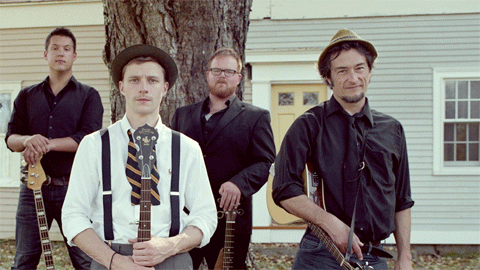 The Ghost of Paul Revere |
The Ghost of Paul Revere don’t waste any time on their debut full-length, Believe. From the very first vocal notes on the opening “After Many Miles,” they announce that this is the best collection of harmonies since Tumbling Bones’ Schemes in the summer of 2012. They are tasteful, measured, precise, and sometimes thrilling.
This opener serves as both introduction and a flag in the ground, as they rotate through each of the three main vocalists — Griffin Sherry, Max Davis, and Sean McCarthy — with a solo a capella verse (well, there’s a stomp-clap rhythm by way of accompaniment) and then come together for harmonied chorus: “Oh, lover, I’ll see you there/ Waiting in the willows with your auburn hair.” If that doesn’t catch your attention, don’t bother with the rest of the disc. This is what they do and who they are and they’re all in.
Because they’ve got a banjo player (Davis), Paul Revere have maybe been pegged as bluegrassy, or at least tied in with the string-band locals, like the Tricky Britches and North of Nashville they played with on New Year’s, but they’re often much more in line with bands like The Head and The Heart or Typhoon, which put a lot more emphasis on vocals, have less traditional song structures, and are more rooted in the rock tradition.
“San Antone” starts slow with a repeating guitar run that stays low and then arcs up for the harmonics behind a chanted, “I lost my love in the heat of San Antone/ I found my love in the cold of the great white north.” Right. Pretty trad. But then the tune ramps right up at the 1:20 mark into what you think is the chorus on the first listen, but never actually slows down, like quick indie rock without plugging in.
This is also our first introduction to Matt Young’s harmonica, which here is really bassy and low down for a mouth harp. The repeating “whooah-whoah” vocal bit it introduces may cause those who’ve tired of Of Monsters and Men and what some see as the shambolic trend among dirty-hippy bands to cringe, but it suits me just fine, and when they ratchet up the pace yet again, it’s pretty damn hot:
“I watched my lover roll me over like a riverstone ... You’ve got pain in your bones/ You know you are not alone.”
They shake things up a bit later in the 11-song album, though. “The Storm” would fit nicely on a Mallett Brothers record, opening with an isolated banjo and dressed-up vocals, but then settling into a guitar strum and transitioning to a song with a piece of grass in its teeth.
Sure, they walk an anachronistic line like a lot of other string bands, but when they sing “my father died in his house/ It’s all he left to me,” you really do imagine a house bleached out on the great plains, with waves of reddish-brown grass and rolling hills and just maybe a solitary tree next to it with an old tire swing, and a fading white picket fence around the whole thing.